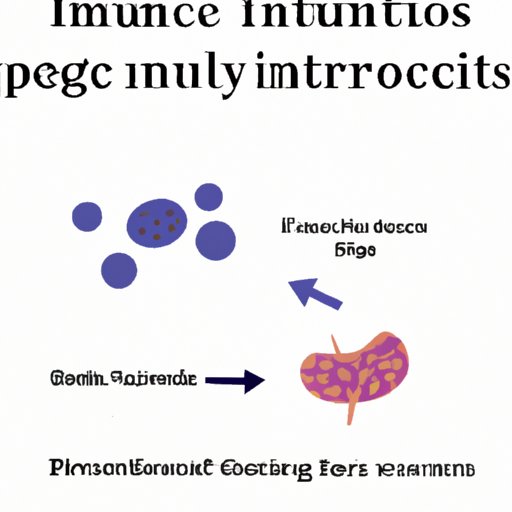
Introduction
According to a report by the National Institute of Child Health and Human Development (NICHD), Polycystic Ovary Syndrome (PCOS) is the most prevalent hormonal disorder affecting women of reproductive age. While scientists and medical professionals have been trying to understand the underlying causes of PCOS, there has been growing interest in whether or not the disorder is linked to autoimmune diseases. In this article, we explore the question, “is PCOS an autoimmune disease?” by examining current research and understanding the complexities of both conditions.
Exploring the Link between PCOS and Autoimmune Disorders
Autoimmune disorders occur when the immune system mistakenly attacks healthy cells in the body, leading to damage and impairment of normal functioning. Some common autoimmune disorders include rheumatoid arthritis, lupus, and multiple sclerosis. Researchers have noted that people with PCOS are more likely to have autoimmune conditions than those without the syndrome. A study published in the Journal of Clinical Endocrinology and Metabolism found that the risk of developing an autoimmune disorder was higher in women with PCOS compared to those without.
Furthermore, the study revealed that thyroid diseases, type 1 diabetes, and inflammatory bowel disease were among the autoimmune conditions commonly associated with PCOS. The reason for this relationship is not yet fully understood and continues to be a subject of ongoing research.

The Science Behind PCOS and Its Potential Autoimmune Connection
PCOS is a hormonal disorder that affects the ovaries and often causes irregular periods, ovarian cysts, and difficulty conceiving. It is believed to be caused by a hormonal imbalance, specifically involving insulin resistance and androgen hormones. However, there is also evidence that PCOS may be influenced by the immune system.
Research has shown that women with PCOS have higher levels of certain immune cells and inflammation markers in their bodies, which could suggest an autoimmune component. A study in the Journal of Clinical Endocrinology and Metabolism found that women with PCOS had higher levels of certain inflammatory markers compared to women without PCOS. In addition, some researchers believe that the elevated testosterone levels associated with PCOS could also trigger an autoimmune response.
Debunking the Myth: Understanding Whether PCOS is an Autoimmune Disease
Despite the evidence linking PCOS with autoimmune disorders, it is important to note that PCOS is not itself considered an autoimmune disease. Autoimmune diseases are caused by an immune system that mistakenly attacks healthy cells, whereas PCOS is caused by hormonal imbalances and other genetic and environmental factors.
While there is an association between PCOS and autoimmune disorders, the evidence linking the two is relatively limited. Researchers continue to study the link between the two conditions, as understanding more about the relationship could help improve diagnosis and treatment outcomes.
The Role of Inflammation in PCOS and Its Possible Autoimmune Component
Inflammation is a natural response by the body’s immune system to infection or injury. However, research has shown that chronic inflammation can contribute to the development of a range of diseases, including PCOS. Women with PCOS often have higher levels of inflammation in their bodies, whether or not they have a co-occurring autoimmune disorder.
Studies have found that inflammation may also be causing insulin resistance, which is commonly seen in women with PCOS. Furthermore, it has been suggested that the immune system may play a role in the development of insulin resistance. These pieces of evidence contribute to the theory that there could be an autoimmune component associated with the development of PCOS.
Autoimmune or Not? Understanding the Complexities of PCOS
Given the limited evidence linking PCOS and autoimmune disorders, it is important to approach the topic with an open mind and a broader perspective about PCOS and its complexities. Researchers need to conduct further studies to establish the exact nature and the extent of the relationship between the two conditions.
PCOS is a complex disorder that is caused by a variety of factors, including genetics, metabolism, and lifestyle. Regardless of whether there is an autoimmune component to PCOS, it is essential to treat the hormonal imbalances and other symptoms associated with PCOS by working with qualified health professionals.
PCOS and Autoimmunity: Bridging the Gap between Research and Clinical Practice
The association between PCOS and autoimmune disorders has important implications for clinical practice. Women with PCOS should be screened for autoimmune conditions to ensure that any related disorders are diagnosed and treated appropriately.
Medical practitioners should consider an individualized and holistic approach to PCOS management that takes into account the diverse factors that contribute to the onset and progression of the disorder. This includes addressing autoimmunity concerns and implementing specific measures to manage symptoms and improve fertility.
Navigating the Gray Area: Discussing the Relationship between PCOS and Autoimmune Disorders
Diagnosing and treating PCOS can be challenging, particularly when considering the potential for related autoimmune conditions. PCOS patients should seek out healthcare providers who specialize in the condition and have experience treating co-occurring autoimmune disorders. Advocating for comprehensive care will help ensure that patients receive the best possible outcomes.
Conclusion
While PCOS is not itself considered an autoimmune disorder, there is an association between PCOS and autoimmune conditions. Research suggests a potential link between PCOS and autoimmune disorders, particularly those related to inflammation. Further research is necessary to establish the exact nature of the relationship between the two conditions and to improve the diagnosis and treatment of PCOS. By taking a broad and holistic approach to treating PCOS, healthcare providers can help women manage their symptoms and improve quality of life.




